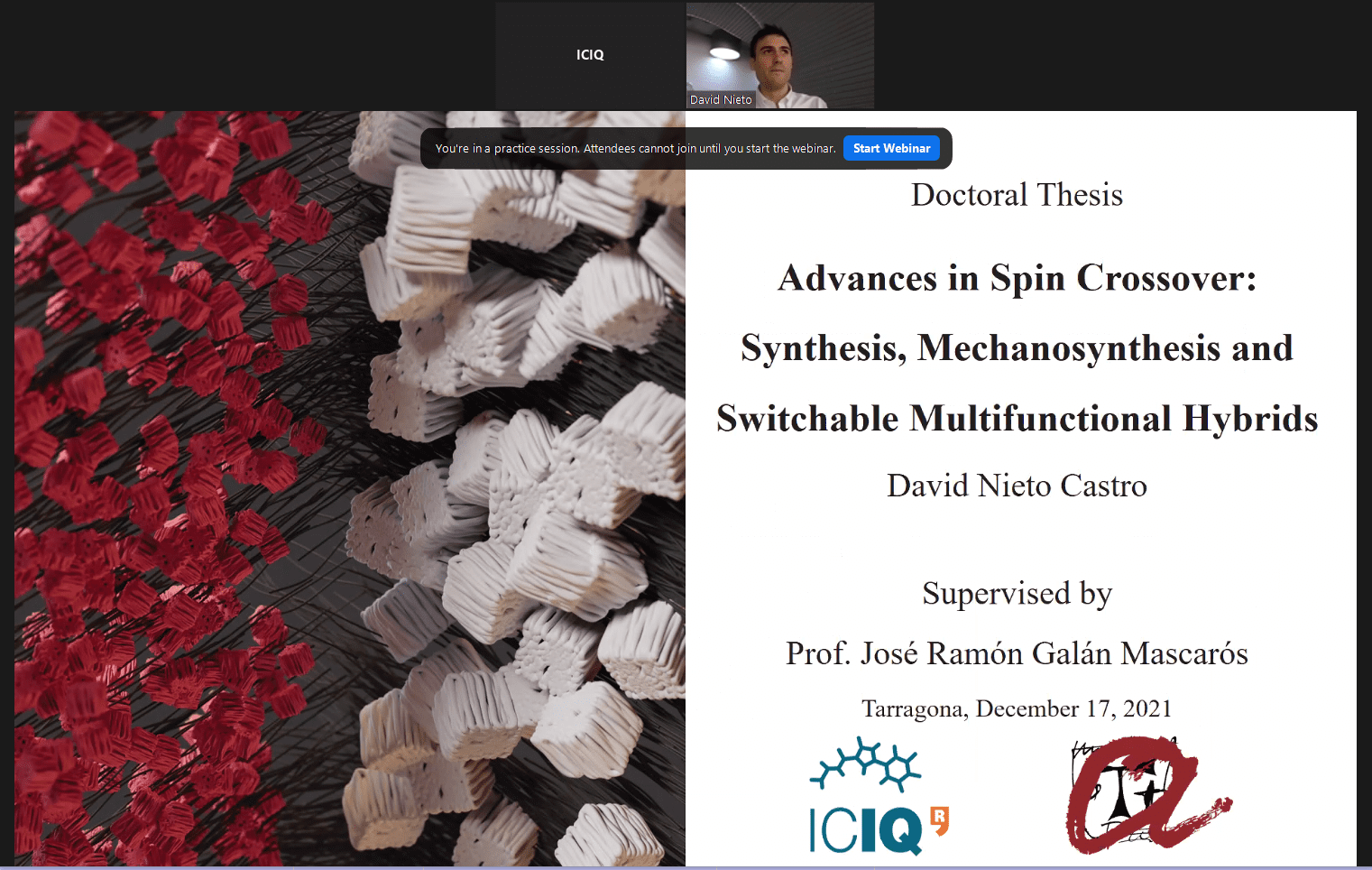New Doctor at ICIQ!
David Nieto, PhD student under the supervision of Prof. José-Ramón Galán-Mascarós (ICIQ), has defended his PhD thesis entitled “Advances in Spin Crossover: Synthesis, Mechanosynthesis and Switchable Multifunctional Hybrids” (assigned to the Department of Physical and Inorganic Chemistry of the Universitat Rovira i Virgili) publicly on December 17th.
The members of the evaluation committee were Prof. Carmen Jiménez (Univeristy of Sevilla), Dr. Mónica Giménez (Univeristy of Valencia) and Dr. Gabor Mólnar (Univeristy of Toulouse)
Dr. Nieto is from Salamanca, where he did his bachelor’s in Chemistry at Universidad de Salamanca. In 2017, he joined the Galán-Mascarós group at ICIQ as a summer fellow and then did the URV Master in Nanoscience, Materials and Processes before joining the group as a PhD student. Outside the lab, he enjoys building Legos (especially during the winter break), cinema, music, sports, and swimming in cold water – no matter the weather.
What is your thesis about?
My project has focused on new processes for the synthesis of spin-crossover compounds. For instance, instead of synthesising them from a solution, I have used mecano-synthesis I have also optimised these compounds to fine-tune their hysteresis. Spin cross-over compounds change their properties depending on temperature or other factors. When changing from one state to the other their magnetism, electronic configuration, physical properties and other characteristics change, which makes them very interesting. Some of these compounds even have memory and thus, can be used to store information. In the future, this research could be used to build smaller actuators to store information, which would in turn diminish the size of devices.
From the lessons learnt during the thesis, which one do you value the most?
Networking and outreach. ICIQ is a great place to network, you can meet a lot of people doing interesting research through your colleagues and supervisors, and with a bit of luck, they might even be open to collaborating with you! I’ve also enjoyed doing outreach activities. It’s a great way to hone your communication skills – and kids are always fun to work with.
Who has been your biggest influence during these years?
My brother is someone whom I have always admired and followed in his footsteps. Many people from ICIQ have influenced and motivated me, but I want to shout out to Felipe Garcés, who’s been a wonderful supervisor and lab mate with a trove of scientific knowledge, and who’s always been there with a smile to teach me.
What ICIQ moment you’ll never forget?
The first time I saw hysteresis on an electric/conductive matrix. I was with my supervisors, Felipe and Pili, and we started jumping around celebrating that it had worked. I think it’s the time I’ve been most excited about an experiment.
What will you miss the most from ICIQ?
The table tennis moments. I think it’s a great asset because as PhD students we put in a lot of time at work. The tennis table is a great place to meet people, as it gives you a place to de-stress with your colleagues and have fun. I’ll also miss the people from my lab and JR, my supervisor, who has given me a lot of freedom to pursue my thesis.
What’s next?
I’ll stay in the Galán-Mascarós group as a postdoc for a year, and later, we will see!
One thing about you that we might not know about: I really like churches because they make me feel at peace, just like cinemas. Every time I’m in a new city I have to visit its church.
If you were to become a piece of lab equipment, you’d be a…. I’d be a ball grinder because it’s the equipment I’ve used the most during my thesis and because I would never have thought that such a small tool could be so versatile and allow me to do all the stuff I’ve done.
Related news

Let's create a brighter future
Join our team to work with renowned researchers, tackle groundbreaking
projects and contribute to meaningful scientific advancements








 20-12-2024
20-12-2024 


















